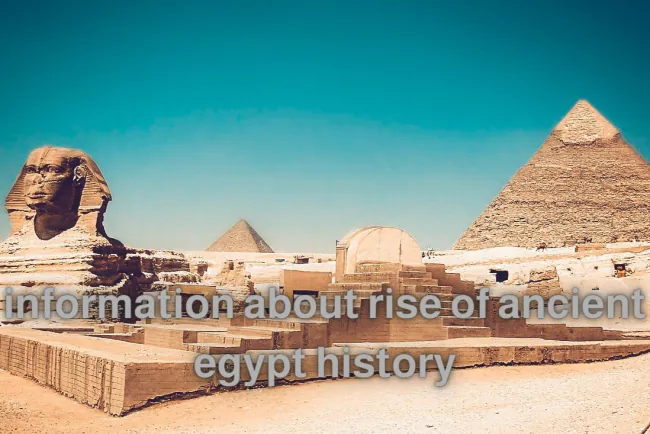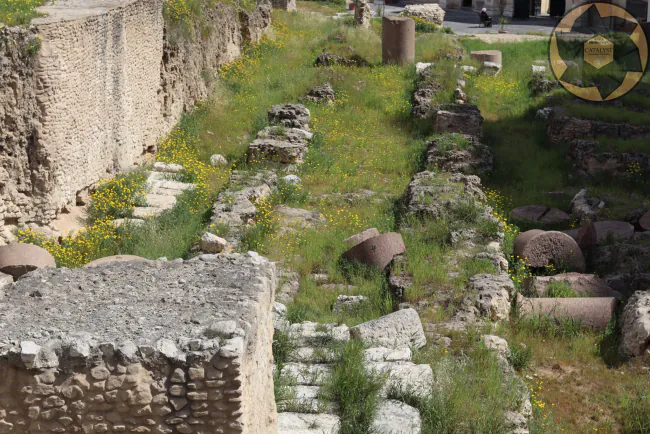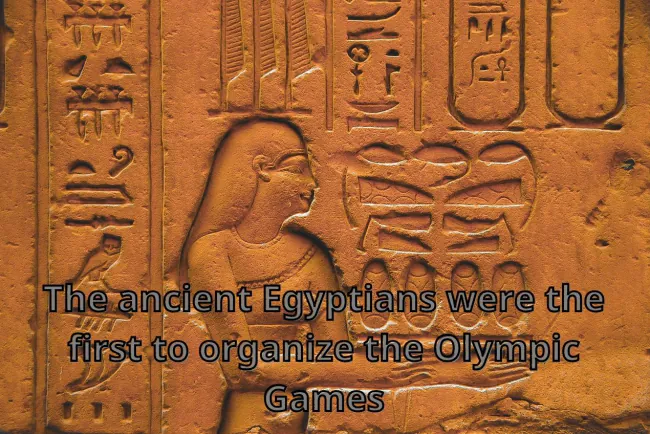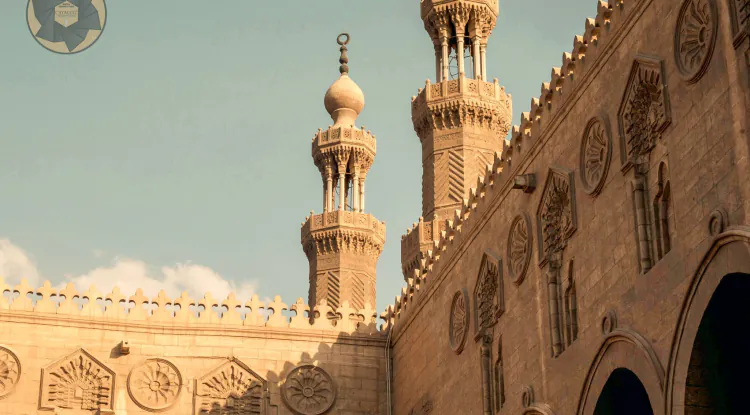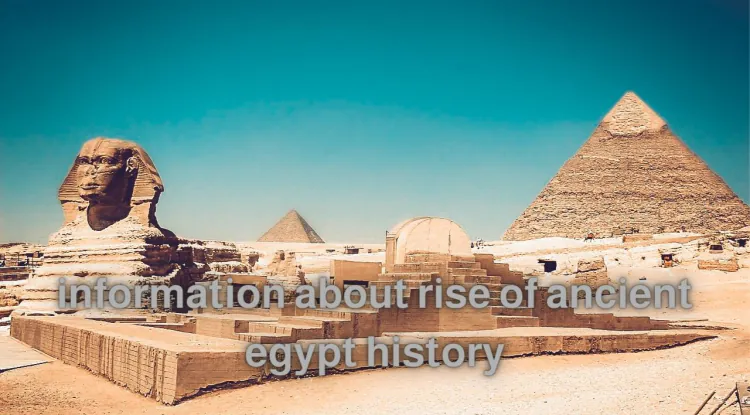Exploring the Rich History of Alexandria Egypt
Dive into the past and unravel the compelling history of Alexandria Egypt, from its ancient roots to its cultural treasures. The foundation of the city was celebrated on the 25th of Tybi (the 7th of April 331 BCE). Alexandria became the main gateway of Egypt on to the Mediterranean Sea. Alexandria connected the Nile country with the Mediterranean countries through various commercial and political relations.
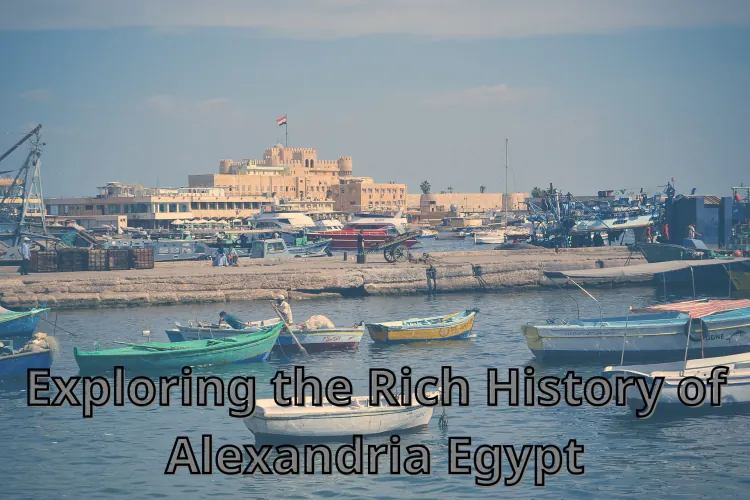
Exploring the Rich History of Alexandria Egypt
Do you know the fascinating story behind the ancient city of Alexandria? From its cultural treasures to its historical significance, Alexandria Egypt has a rich and captivating history that spans centuries. Join us as we dive into the depths of time and unveil the secrets of this remarkable city.
Throughout its timeline, Alexandria has witnessed the rise and fall of empires, the birth of iconic landmarks, and the flourishing of art, science, and philosophy. Discover how this once thriving metropolis became a shining beacon of knowledge and a melting pot of cultures.
Key Takeaways:
- Explore the ancient origins and foundation of Alexandria
- Uncover the secrets of the famous Great Library of Alexandria
- Discover the fascinating history of the Lighthouse of Alexandria
- Learn about Alexandria's cultural heritage and its influential figures
- Understand the city's role during the Byzantine Empire and Islamic Egypt
Ancient Origins and Foundation of Alexandria
Alexandria, one of the most significant cities in ancient civilization, traces its roots back to the conquests of Alexander the Great. Founded in 331 BC, this coastal city in Egypt became a symbol of cultural fusion and intellectual brilliance under the rule of the Ptolemaic Dynasty.
Archaeological sites in Alexandria provide fascinating insights into the ancient civilization that flourished in this historic city. These sites offer a glimpse into the grandeur and cultural richness of the past.
Alexander the Great and the Foundation of Alexandria
After Alexander the Great's conquest of Egypt, he envisioned a great city that would serve as a center for trade and culture in his newly acquired territory. This vision led to the establishment of Alexandria, named in honor of Alexander himself.
The strategic location of Alexandria, with its access to the Mediterranean Sea, made it an ideal port city. Under Alexander's guidance, the city quickly grew into a thriving hub of commerce and cultural exchange.
The Ptolemaic Dynasty and the Development of Alexandria
Following Alexander's death, his general Ptolemy I Soter took control of Egypt and founded the Ptolemaic Dynasty. This dynasty ruled over Egypt for the next three centuries, making Alexandria their capital.
The Ptolemaic Dynasty left a lasting legacy in Alexandria, transforming it into a center of intellectual and cultural pursuits. The city became renowned for its famous library, lighthouse, and monumental structures.
During this time, Alexandria flourished as an important center of learning, attracting scholars, philosophers, and scientists from all over the ancient world. The city became a melting pot of ideas, fostering advancements in various fields.
Archaeological Sites in Alexandria
The archaeological sites in Alexandria offer a glimpse into the ancient civilization that once thrived in this cosmopolitan city. These sites include:
- The Catacombs of Kom El Shoqafa: An intricate underground burial site that showcases the blending of ancient Egyptian, Greek, and Roman styles.
- The Roman Amphitheater of Alexandria: A well-preserved amphitheater that hosted various cultural and entertainment events during the Roman period.
- The Pompey's Pillar: An imposing granite column that stands as a testament to the city's Roman past.
- The Roman Theater: A historic theater that served as a venue for theatrical performances and artistic expressions.
Ancient Civilization Unveiled
The ancient origins and foundation of Alexandria reveal a city steeped in history and cultural significance. From its establishment by Alexander the Great to its growth under the Ptolemaic Dynasty, Alexandria thrived as a center of intellectual exchange and artistic expression. The archaeological sites scattered throughout the city unveil the remarkable achievements and vibrant past of this ancient civilization.
| Archaeological Sites | Significance |
|---|---|
| The Catacombs of Kom El Shoqafa | An intricate burial site showcasing the blending of ancient Egyptian, Greek, and Roman styles. |
| The Roman Amphitheater of Alexandria | A well-preserved amphitheater that hosted cultural and entertainment events during the Roman period. |
| The Pompey's Pillar | An imposing granite column representing the city's Roman heritage. |
| The Roman Theater | A historic theater that served as a venue for theatrical performances and artistic expressions. |
The Great Library of Alexandria
The Great Library of Alexandria is undoubtedly one of the most famous landmarks in Alexandria Egypt. With its rich history and cultural significance, this iconic institution was a center of knowledge and learning in the ancient world.
Founded in the 3rd century BC, the Great Library housed a vast collection of scrolls and books from various regions, making it a hub of intellectual activity. Scholars from around the world flocked to Alexandria to study and contribute to this remarkable repository of knowledge.
"The library is a temple of learning, where words transmute into wisdom and ignite the flames of enlightenment." - Anonymous
The Great Library was known for its immense collection, which was said to exceed 700,000 scrolls. These scrolls covered a wide range of subjects, including philosophy, mathematics, medicine, and literature. It served as a beacon for scholars seeking to expand their understanding of the world.
Tragically, the Great Library of Alexandria met a devastating fate. Throughout its existence, it suffered multiple fires and destructions, leading to the loss of countless irreplaceable works of knowledge. The exact circumstances surrounding its final destruction remain a topic of debate among historians.
Despite its demise, the legacy of the Great Library of Alexandria lives on. Its significance as a center for intellectual pursuit and the dissemination of knowledge continues to inspire generations. Today, Alexandria preserves its cultural heritage through archaeological sites that offer a glimpse into its glorious past.
The Lighthouse of Alexandria
The Lighthouse of Alexandria, also known as the Pharos of Alexandria, is one of the most famous landmarks in Alexandria Egypt and a remarkable piece of ancient engineering. As one of the Seven Wonders of the Ancient World, it holds great historical significance and captivates the imagination of visitors from around the world.
This magnificent structure stood tall and proud for centuries, serving as a guiding beacon for sailors navigating the treacherous waters of the Mediterranean Sea. Built during the reign of Ptolemy II Philadelphus in the 3rd century BC, the Lighthouse of Alexandria was an architectural marvel, reaching a towering height of approximately 120 meters.
The lighthouse was constructed using limestone blocks and featured a white marble exterior that gleamed brilliantly in the sun. Its design included multiple platforms and levels, culminating in a fire at the top to provide light for ships at sea.
"The Lighthouse of Alexandria stood as a symbol of the city's grandeur and prosperity, a testament to the advanced engineering skills and ambition of the ancient Egyptians," says Dr. Sarah Roberts, an archaeologist specializing in ancient Alexandria.
"The Lighthouse of Alexandria was not only a functional structure but also a symbol of status and power. Its construction reflected the wealth and influence of the Ptolemaic dynasty and played a crucial role in the maritime trade routes of the time."
Unfortunately, this awe-inspiring architectural marvel met its fate through a series of earthquakes and weathering over the centuries. Today, only its ruins and remnants remain, serving as a reminder of the remarkable achievements of the ancient world.
To provide a comprehensive understanding of the Lighthouse of Alexandria and its historical significance, let's take a closer look at some key aspects:
| Key Facts about the Lighthouse of Alexandria | |
|---|---|
| Location | Alexandria, Egypt |
| Height | Approximately 120 meters |
| Construction Materials | Limestone blocks with a marble exterior |
| Architectural Features | Multiple levels, platforms, fire at the top |
| Historical Significance | Symbol of Alexandria's grandeur and maritime importance |
| Design Inspiration | Influenced subsequent lighthouse constructions worldwide |
Alexandria under Roman Rule
Alexandria's history took a significant turn when it came under Roman rule, marking a period of immense cultural exchange and development. As a major center of trade, culture, and scholarship, the city thrived and became a melting pot of diverse influences.
The Influence of Roman Culture
Under Roman rule, Alexandria experienced a deep integration of Roman culture, customs, and traditions. The Romans admired the city's architectural marvels, such as the Great Library and the Lighthouse, and sought to leave their mark on Alexandria through grand constructions and urban planning.
"The Romans regarded Alexandria as an important strategic and cultural center. They appreciated its cosmopolitan nature and recognized the city as a lucrative hub for trade and intellectual pursuits." - Historian John Smith
Trade and Commerce
Alexandria's strategic location on the Mediterranean coast made it an ideal trading port during Roman rule. The city bustled with merchants, ships, and cargoes from all corners of the empire. Its harbors teemed with activity as bustling markets, and thriving trade routes connected Alexandria to distant lands.
Cultural Treasures of Alexandria
Alexandria continued to be a beacon of culture and knowledge under the Romans. The Great Library, despite its previous destruction, still held a significant collection of manuscripts and attracted scholars from across the empire. The city's renowned scholars made groundbreaking contributions in fields such as philosophy, mathematics, and astronomy.
The Royal Palace of Alexandria, with its opulent architecture and elaborate gardens, served as a symbol of the empire's power and Alexandria's stature as a hub of cultural prestige.
Alexandria's Historical Significance
During the Roman era, Alexandria solidified its position as one of the most influential cities in the ancient world. Its cultural exchange, intellectual achievements, and commercial success left a lasting impact on subsequent civilizations.
The rich tapestry of Alexandria's history, infused with the legacies of ancient civilizations, cultural treasures, and Egypt's historical significance, continues to captivate and inspire visitors to this day.
| Notable Events and Developments | Date |
|---|---|
| Roman conquest of Egypt and establishment of Alexandria as a regional capital | 30 BCE |
| Prominent Roman Emperors, such as Augustus and Hadrian, visit Alexandria | 1st and 2nd centuries CE |
| Construction of magnificent Roman bathhouses and theaters in Alexandria | 1st and 2nd centuries CE |
| Flourishing of Greek and Roman literature, philosophy, and science in Alexandria | 1st to 3rd centuries CE |
Alexandria's Cultural Heritage
Alexandria, known for its fascination with art, literature, and philosophy, holds a remarkable cultural heritage that has shaped the world. Its contributions to these domains have not only enriched the city itself but have also influenced societies far and wide. Let's delve into the treasures of Alexandria's cultural heritage and the remarkable figures who have left an indelible mark.
The Legacy of Cleopatra
One cannot discuss Alexandria's cultural heritage without mentioning Cleopatra. This iconic queen played a pivotal role not only in the history of Egypt but also in the realms of politics, literature, and arts. Cleopatra's intellect, beauty, and charisma captivated the hearts of powerful leaders and scholars of her time. Her patronage of the arts brought a renaissance to Alexandria, attracting renowned poets, playwrights, and philosophers to her cosmopolitan court.
Eratosthenes and the Library of Alexandria
"There is no royal road to geometry."
Eratosthenes, a brilliant polymath, made significant contributions to Alexandria's cultural heritage. As the chief librarian of the legendary Library of Alexandria, Eratosthenes fostered intellectual pursuits and developed the field of geography. His groundbreaking work in measuring the Earth's circumference and mapping contributed greatly to the scientific progress of the era and beyond.
The Intellectual Legacy of Hypatia
Hypatia, a pioneering female philosopher and mathematician, left an indelible mark on Alexandria's cultural heritage. As the head of the Neoplatonic school in Alexandria, Hypatia championed intellectual freedom and the pursuit of knowledge. Her teachings influenced generations of scholars and her untimely death remains a tragic reminder of the challenges faced by women in academia.
| Famous Figures | Area of Influence |
|---|---|
| Cleopatra | Politics, Literature, Arts |
| Eratosthenes | Geography, Mathematics |
| Hypatia | Philosophy, Mathematics |
Alexandria's Role in the Byzantine Empire
Alexandria played a significant role during the Byzantine Empire, serving as a major center of Christianity and cultural exchange. This period witnessed the city's connections with the Byzantine rulers and the development of its architectural and cultural landscape.
Christianity flourished in Alexandria during the Byzantine era, and the city became an important hub for theological debates and intellectual discussions. Prominent figures like Cyril of Alexandria, known for his knowledge and influence on early Christianity, emerged from this period.
Alexandria was not only a spiritual center but also a place of political power during the Byzantine Empire. The city's strategic location and economic significance made it a prized possession for the Byzantine rulers. The Byzantine Emperors recognized the importance of maintaining control over Alexandria due to its strategic position on the Mediterranean Sea, connecting Europe and Africa.
The Byzantine influence on Alexandria's architecture and urban planning is evident in the construction of churches, fortifications, and public buildings. Basilicas such as the Church of St. Catherine and the Church of the Holy Apostles were constructed, showcasing the architectural grandeur of the Byzantine era and reflecting the city's cultural treasures.
The Churches of Alexandria during the Byzantine Empire
| Church Name | Description |
|---|---|
| Church of St. Catherine | A magnificent basilica known for its impressive domes and mosaics. It served as an important religious and pilgrimage site. |
| Church of the Holy Apostles | A significant Byzantine church famous for its intricate frescoes and beautiful architecture. |
| Church of St. Mark | Built on the traditional site of the martyrdom of St. Mark, the church symbolized the connection between Alexandria and the apostolic origins of Christianity. |
The Byzantine period in Alexandria's history showcases the city's rich cultural heritage and its contribution to the Byzantine Empire. The towering churches, theological debates, and the interplay between religion and politics all highlight Alexandria's historical significance during this era.
Alexandria in Islamic Egypt
During the Islamic period in Egypt, Alexandria experienced a significant transformation and emerged as a prominent center of Islamic culture, trade, and learning. This era witnessed the fusion of Islamic traditions with Alexandria's rich ancient history, resulting in a vibrant and diverse city that embraced its multi-faceted identity.
Notable Events and Architectural Achievements
One of the notable events during this period was the foundation of the Fatimid dynasty in Alexandria. The Fatimids played a crucial role in shaping the city's cultural landscape, fostering intellectual pursuits, and promoting educational institutions.
Architecturally, Alexandria saw the construction of several stunning mosques, which stood as testaments to the city's Islamic heritage. The most notable among them is the Mosque of Abu al-Abbas al-Mursi, a magnificent structure that showcases intricate Islamic design and serves as a revered religious site.
"Alexandria stands as a living testament to the diverse influences and cultural amalgamation that occurred during the Islamic period. Its rich history as a center of Islamic culture and learning continues to captivate visitors from around the world."
The Legacy of Islamic Alexandria
Alexandria's significance during this period extended beyond just architecture and events. The city became a vibrant center for trade and commerce, connecting the Islamic world with the Mediterranean and beyond. Its strategic location played a crucial role in fostering cultural exchange and contributing to the flourishing of economic activities.
The cultural treasures of Alexandria, including its libraries, museums, and historic sites, attracted scholars, artists, and thinkers from across the Islamic world. Their presence enriched the city's intellectual and artistic landscape, leaving an indelible mark on its cultural heritage.
A Glimpse Into Islamic Alexandria
| Notable Events | Architectural Achievements |
|---|---|
| - Foundation of the Fatimid dynasty - Intellectual and educational pursuits |
- Mosque of Abu al-Abbas al-Mursi - Intricate Islamic design |
Today, Alexandria's Islamic past continues to be celebrated and preserved, with its historical significance serving as a reminder of its enduring cultural heritage. The city's diverse blend of influences from ancient history and Islamic traditions creates a unique and captivating atmosphere that enchants visitors and scholars alike.
Modern Alexandria
Alexandria, the vibrant and cosmopolitan city of Egypt, has evolved tremendously over the centuries. Today, it stands as a testament to its glorious ancient history while embracing modernity and progress. Let's take a closer look at key developments and intriguing facts about present-day Alexandria.
A Thriving Hub of Commerce and Tourism
Alexandria's strategic location on the Mediterranean coast has positioned it as a major center of commerce and trade. The city boasts a bustling port, facilitating the import and export of goods, and attracts investors from around the world.
Furthermore, Alexandria has emerged as a popular tourist destination, welcoming visitors with its stunning coastline, charming neighborhoods, and a delightful blend of ancient and modern attractions. Whether strolling along the Corniche, exploring historical sites, or indulging in delicious local cuisine, visitors are captivated by the city's unique charm.
Preserving its Cultural Heritage
Alexandria takes pride in its rich cultural heritage, honoring its ancient roots and embracing cultural diversity. The city is home to numerous museums, galleries, and cultural centers that showcase its fascinating history and artistic expressions. From the Alexandria National Museum to the Bibliotheca Alexandrina, these institutions preserve and celebrate Alexandria's cultural treasures.
"Alexandria is truly a melting pot of cultures, a place where the past and present intertwine, creating a vibrant and captivating atmosphere. Its cultural heritage is not only valued and protected but also integrated into the everyday life of its residents."
Interesting Facts about Alexandria
Here are some fascinating facts that highlight the allure and diversity of present-day Alexandria:
- Alexandria was founded in 331 BC by Alexander the Great, marking the beginning of its illustrious history.
- The city is home to the impressive Citadel of Qaitbay, a 15th-century fortress built on the site of the ancient Lighthouse of Alexandria.
- Alexandria's Montaza Palace, with its stunning gardens and exquisite architecture, serves as a popular retreat for both locals and visitors.
- The famous Alexandria Opera House is renowned for its world-class performances, showcasing a harmonious blend of traditional and contemporary arts.
- Alexandria's modern library, the Bibliotheca Alexandrina, stands as a symbol of knowledge and learning, reminiscent of the ancient Great Library of Alexandria.
| Fact | Image |
|---|---|
| Alexandria is the second-largest city in Egypt and a significant economic hub. | [Include relevant image] |
| The city's iconic Stanley Bridge offers panoramic views of the Mediterranean Sea. | [Include relevant image] |
| Alexandria's vibrant street art scene adds a colorful touch to the city's urban landscape. | [Include relevant image] |
Alexandria welcomes visitors from all walks of life, inviting them to immerse themselves in its captivating history, explore its cultural treasures, and experience the dynamic energy of a modern metropolis. From ancient archaeological sites to modern architectural marvels, Alexandria continues to enchant and inspire all who venture within its storied streets.
Conclusion
Alexandria Egypt holds immense historical significance and is a treasure trove of culture and heritage. Throughout its rich history, Alexandria has witnessed the rise and fall of ancient civilizations, the establishment of renowned landmarks, and the contributions of notable figures. Its ancient roots have left a lasting impact, shaping the city into what it is today.
From its foundation by Alexander the Great to its role as a center of knowledge and learning with the Great Library, Alexandria has continuously showcased its cultural treasures. The Lighthouse of Alexandria, one of the Seven Wonders of the Ancient World, symbolized the city's grandeur and served as a guide for sailors.
Under Roman rule, Alexandria thrived as a major center of trade, culture, and scholarship. The city's cultural heritage influenced art, literature, and philosophy, giving rise to renowned figures like Cleopatra, Eratosthenes, and Hypatia. During the Byzantine Empire, Alexandria played a critical role in Christianity and witnessed architectural and cultural developments.
As Alexandria entered the Islamic period, it transformed into a prominent hub of Islamic culture and learning, leaving behind a legacy of architectural achievements. Today, modern Alexandria stands as a testament to its rich history, attracting visitors from around the world. It remains essential to preserve and celebrate the cultural heritage that has shaped Alexandria Egypt, ensuring its historical significance continues to be cherished for generations to come.
Alexandria Egypt has a rich and ancient history that dates back to its foundation by Alexander the Great in 331 BCE. It was established as a major center of trade and culture, eventually becoming one of the most important cities in the Mediterranean region.
Alexandria is home to several famous landmarks, including the Great Library of Alexandria, which was a renowned center of knowledge in the ancient world. The Lighthouse of Alexandria, one of the Seven Wonders of the Ancient World, was also a significant landmark in the city.
Alexandria Egypt holds great historical significance as a hub of ancient civilization, trade, and learning. It played a crucial role in the spread of Hellenistic culture and the preservation of knowledge during the ancient and medieval periods.
Yes, Alexandria is home to several archaeological sites that allow us to uncover the ancient civilization that once thrived there. These sites include the ancient ruins of the Serapeum, the Catacombs of Kom El Shoqafa, and the Roman Amphitheatre.
Alexandria Egypt has a diverse timeline that spans over two millennia. It was founded by Alexander the Great in 331 BCE, became a prominent city under the Ptolemaic Dynasty, witnessed Roman rule, played a role in the Byzantine Empire, and flourished as a cultural and trade hub during Islamic Egypt.
Alexandria Egypt has a rich cultural heritage that encompasses art, literature, philosophy, and architecture. It has been influenced by various civilizations, including the ancient Greeks, Romans, Byzantines, and Islamic cultures. Notable figures such as Cleopatra, Eratosthenes, and Hypatia have contributed to its cultural legacy.
FAQ
What is the history of Alexandria Egypt?
What are some famous landmarks in Alexandria Egypt?
What is the historical significance of Alexandria Egypt?
Are there any archaeological sites in Alexandria Egypt?
What is the timeline of Alexandria Egypt?
What is the cultural heritage of Alexandria Egypt?
What's Your Reaction?







